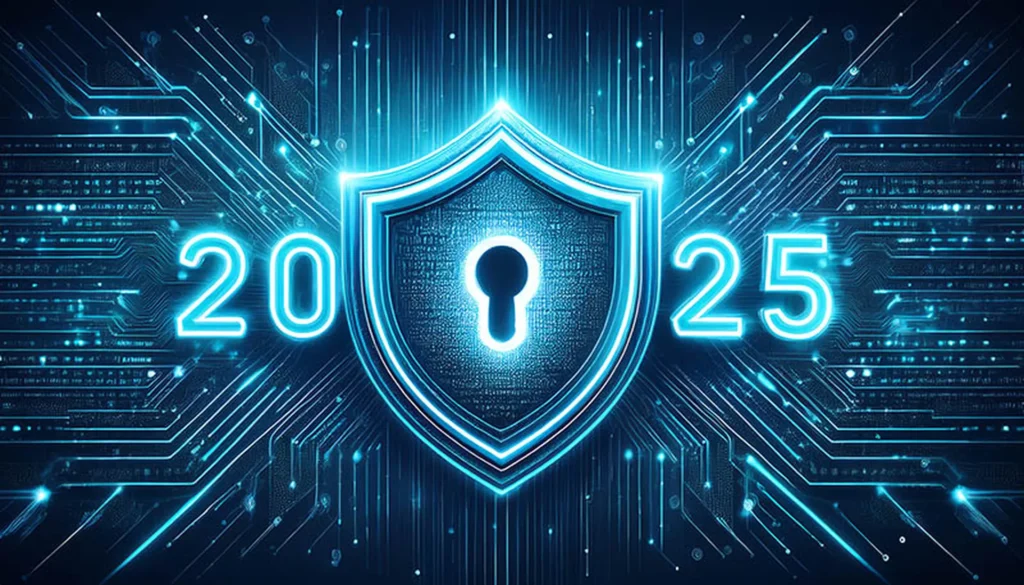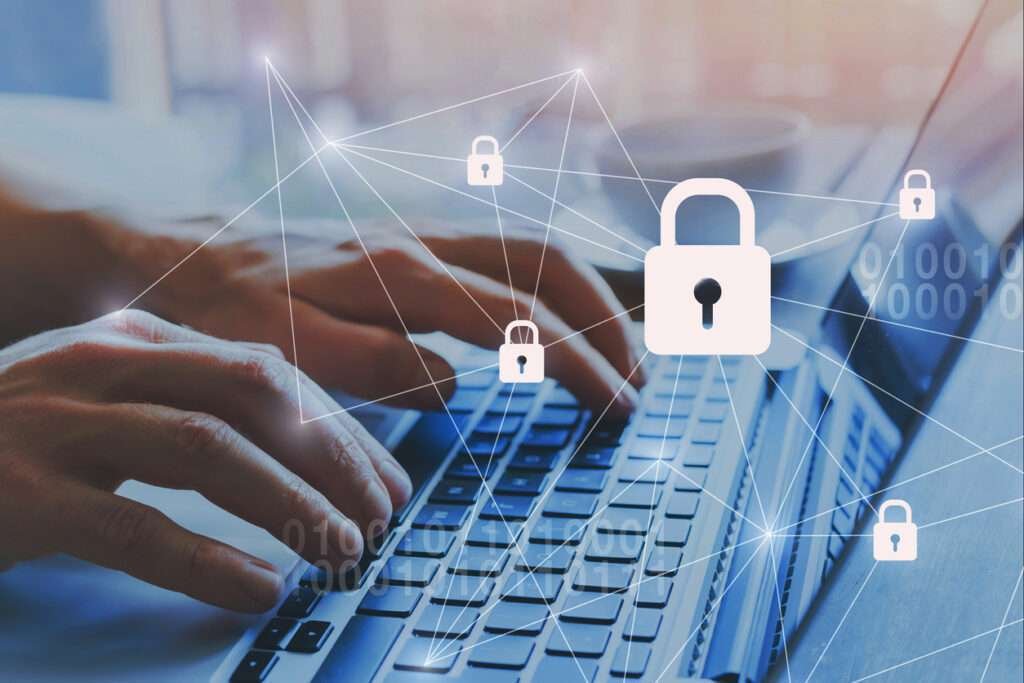A staggering 81% of executives believe that blockchain technology will have a major impact on their industries within the next few years1. This shows how big a deal blockchain is for the financial sector. It’s not just a trend; it’s a game-changer for digital transactions, cyber protection, and financial security.
Blockchain is a digital ledger that keeps records safely on a network of computers. It’s open, unchangeable, and hard to hack2. This tech can make transactions safer and more trustworthy. With the global blockchain market set to grow to $39.7 billion by 2025, blockchain is here to stay1.

Key Takeaways
- Blockchain technology is a decentralized digital ledger that securely stores records across a network of computers.
- The global blockchain market is projected to grow from $3.0 billion in 2020 to $39.7 billion by 2025, at a compound annual growth rate (CAGR) of 67.3%1.
- Blockchain technology has the power to boost cybersecurity, protect financial data, and make transactions more reliable.
- 81% of executives believe that blockchain technology will have a major impact on their industries within the next few years1.
- Blockchain technology is being adopted by various industries, including finance, healthcare, and supply chain management.
- The use of blockchain technology can reduce operational costs by up to 30% for financial service providers1.
Understanding the Revolutionary Nature of Decentralized Network
Decentralized network has been all the rage for a few years. It’s no wonder, given its impact on many industries3. At its heart, blockchain is a decentralized ledger that keeps secure financial data safe and moves it around. This makes it a big deal in finance and healthcare.
Blockchain makes financial transactions safer. It creates a clear, unchangeable record of all dealings. This is key for cryptocurrency transactions, which need trusted transactions to stay secure4.
The Evolution of Digital Ledger Technology
Digital ledger tech has grown a lot, with blockchain being a major leap forward. It uses a decentralized ledger to cut out middlemen. This lowers costs and speeds up transactions3.
Core Components of Blockchain Architecture
Blockchain’s main parts are nodes, crypto algorithms, and a consensus system. These work together to keep the blockchain safe and sound. It’s perfect for secure financial data handling4.
Why Blockchain Matters in Today’s Digital Age
Blockchain could change many fields, like finance, healthcare, and supply chains. It offers a decentralized ledger for encrypted financial data handling. This boosts transparency, cuts costs, and adds security3.
The Role of Blockchain in Financial Security: A Paradigm Shift
We see how financial industry advancements make transactions safer and faster. Blockchain for security has cut down fraud and manipulation risks in financial dealings5. It helps financial institutions keep their customers’ transactions safe, boosting trust in the financial world6.
Blockchain’s decentralized nature brings real-time visibility and openness to financial dealings. This makes it a great choice for financial firms looking to improve their security7. It could cut down operational risks and fraud by half5, changing the financial industry. As we dive deeper into blockchain’s role in financial security, we must weigh its benefits and challenges.

- More transparency and accountability
- Less risk of fraud and manipulation
- Quicker and more efficient financial transactions
As we progress, tackling blockchain’s challenges like scalability and regulatory issues is key. This ensures its widespread use6.
Decentralization: The Backbone of Secure Financial Transactions
Decentralization is key for safe financial deals. It stops one point of failure and lets networks talk directly to each other8. This way, data is spread out, making it harder for hackers to get to it9. Blockchain tech makes sure these deals are safe, without needing to trust each other8.
The good things about decentralization in finance are:
- More security because there’s no single weak spot
- Trust grows with group agreement
- Things get done faster in networks
Also, stopping fraud and protecting identities are big parts of safe finance8. Blockchain helps keep money and personal info safe from thieves9.

In short, decentralization is the core of safe money deals. It’s the base for safe finance, fraud prevention, and identity protection8. As money matters keep changing, decentralization will keep getting more important. It helps people and groups make smart money choices9.
Cryptographic Foundations of Blockchain Security
Cryptographic foundations are key to keeping blockchain systems safe and sound. They use special security protocols, encryption for financial data, and blockchain payment systems. These tools help protect sensitive info and keep it from falling into the wrong hands10. shows how SHA-256 and AES are used to keep Bitcoin transactions and wallets safe.
Digital signatures play a big role in blockchain security. They help prove that transactions are real and haven’t been tampered with. New tech like zk-SNARKs even lets transactions be checked without sharing the details10. explains how this works.
The blockchain market is growing fast, reaching USD 69 billion by 2026. This growth shows how important blockchain tech is11. highlights the need for strong security measures.
Some key parts of blockchain security include:
- Financial data encryption to protect sensitive information
- Blockchain payment systems to facilitate secure transactions
- Cryptocurrency security protocols to prevent unauthorized access
Exploring blockchain security is vital. We must also think about the risks, like 51% attacks. By understanding these risks and using strong security, we can make blockchain safer. This will help it grow in different industries.

Smart Contracts and Automated Security Protocols
Blockchain technology is growing fast, and smart contracts are key to its future. First thought of by Nick Szabo in 199412, they could change how we do money deals. They make transactions faster, more accurate, and cut down on mistakes13.
Smart contracts bring many benefits. They make things clear, unchangeable, and safe. Capgemini says they can cut costs in finance by up to 30%13. They also make it easier and cheaper to send money across borders, saving 40-60% compared to old ways13.
Blockchain and smart contracts together offer a safe place for money deals. This ensures that your crypto is safe and secure.
Some important features of smart contracts are:
- Automated execution of agreements
- Increased efficiency and accuracy
- Immutability and transparency
- Reduced risk of human error
As smart contracts become more common, 30% of business deals will use them by 202514. They could save up to 80% of time spent on contracts14. This makes them a big part of blockchain’s future and secure crypto storage.

Identity Protection and Privacy in Blockchain Systems
We understand how vital blockchain identity protection is. It keeps user identities and sensitive info safe. The first source tells us that Bitcoin’s blockchain, and most others, encrypts records. This means only the person with an address can share their identity15. This shows how important digital currency security protocols are for protecting data.
Financial data encryption is key for secure transactions. With blockchain’s growing use, strong security is needed. Around 95% of companies have faced a data breach in the last year. This makes old identity systems risky16.
Blockchain technology offers many benefits for managing identities. Here are a few:
- It cuts identity theft risk by up to 40% thanks to better security16
- It saves up to 30% in identity checks compared to old ways16
- About 60% of people prefer blockchain for identity solutions16

Blockchain’s Impact on Financial Fraud Prevention
Blockchain technology can greatly reduce financial fraud. It offers a secure and transparent way to make transactions. The second source says, “Blockchain can also help to eliminate fraud as it creates a clear audit trail. It also has multiple redundancies, so it’s almost impossible to alter any information once it’s been uploaded on this network”17. This is key in stopping blockchain fraud prevention.
Blockchain can also lower fraud risks in financial deals. For instance, financial fraud can cause over $40 billion in losses each year in North America alone18. Using blockchain can cut these losses a lot. Also, Accenture’s blockchain smart contracts have shown a 50% drop in fraud risks, thanks to secure, automated transactions without middlemen17.
Using blockchain for secure decentralized finance has many benefits. It lowers fraud risks, makes transactions more transparent, and ensures security. With the blockchain finance market expected to hit $22 billion by 202618, blockchain’s role in finance will grow. It aims to boost security by preventing tampering and reducing fraud risks18.

In conclusion, decentralized networkcan greatly cut down financial fraud and make transactions safer. As it keeps evolving, we’ll see more ways to fight blockchain fraud prevention and secure decentralized finance. Blockchain can help build a safer, more open financial system, benefiting everyone7.
Integration Challenges and Solutions in the Financial Sector
Exploring blockchain technology in finance, we face challenges and solutions. The financial sector is ready for a big change, either disruption or transformation. A major hurdle is following financial regulations, as blockchain must meet these rules.
There are also technical issues, like making blockchain work with current systems. Yet, blockchain’s benefits, like better security and efficiency, make it appealing. A report shows 80% of companies believe blockchain will bring in new money soon19.
Looking at the cost of using blockchain, it’s a big upfront investment. But, it could lead to lower costs and better performance. The fintech blockchain market was $3.17 billion in 2023 and is growing fast, expected to hit $21.67 billion by 202819. Key advantages of blockchain include:
- Improved cybersecurity in blockchain
- Enhanced financial industry advancements
- Increased transparency and traceability
- Reduced transaction costs and improved efficiency
Blockchain in finance offers both challenges and chances. By tackling regulatory, technical, and cost issues, we can build a safer, more efficient system. Blockchain’s decentralized nature means it can be audited in real-time, helping regulators spot problems early20.
The Future of Financial Security Through Blockchain
Looking ahead, decentralized network will be key in the financial sector. It offers cyber protection for safe virtual payments. This makes it vital for banks and other financial groups.
“Blockchain technology achieves decentralized security and trust in several ways”21. This is big, as not following rules can cost millions. Big banks might face fines of $1 billion or more21.
Blockchain has many pluses, like better cyber protection and safe financial data. It can cut transaction costs by up to 90% in some cases21. It also helps track supply chains in real-time, making things smoother and more trustworthy22.
Also, blockchain keeps track of carbon credits, stopping fraud22.
Some main benefits of blockchain include:
- Up to 70% faster transaction processing
- Cost savings of 30% to 50%
- Enhanced cybersecurity and safe digital transactions
The global blockchain market is set to grow to about $163 billion by 202721. As finance evolves, blockchain will be more central to financial security.
Emerging Trends and Innovations in Blockchain Security
Blockchain technology is growing fast, and so is its security. The second source says, “Decentralized network is expected to revolutionise the way we do business, not only in the banking industry but across sectors such as healthcare, government, retail and more”23. This change is because we need better security, safe storage, and faster transactions.
One big area is making blockchain safe from quantum computers. We’re also looking at how different blockchains can talk to each other. Plus, using AI to catch and stop cyber threats is becoming more common. This helps keep blockchain systems safe.
These new trends bring many benefits. For example:
- Transactions are more secure and open
- Blockchain networks work better and faster
- More industries are using blockchain
Experts say blockchain will make things safer, clearer, and more efficient. The blockchain market is expected to grow from USD 3 billion in 2020 to USD 69 billion by 2027, with a 56.1% CAGR24. Keeping up with these trends is key to using blockchain for safe and quick transactions.
Conclusion: Embracing the Blockchain Revolution in Financial Security
Blockchain technology is changing the financial world. It makes transactions safer and more reliable. This is because blockchain is decentralized, which means there’s no single point of failure25.
It also uses advanced cryptography. This means only the right people can see sensitive information25.
Smart contracts and automated security make blockchain even better25. They remove the need for middlemen and reduce errors in transactions25. Plus, data on blockchain can’t be changed or deleted once it’s recorded25.
This solves problems like data fraud and manipulation.
The market for blockchain is growing fast26. Companies like Ripple, Circle, and IBM’s Food Trust are using it to improve security and transparency27. Blockchain could cut fraud by up to 80% and lower transaction costs by 40-80%26.
Even though there are challenges like scalability and regulatory issues26, the future looks bright. New technologies like quantum-resistant cryptography and better consensus mechanisms will make blockchain even safer26. By embracing blockchain, the financial world can become more secure, efficient, and open to everyone27.
FAQ – Frequently Asked Questions
What is blockchain technology and how does it work?
What are the key features of blockchain technology?
How does blockchain enhance financial security?
What are the advantages of decentralization in blockchain-based financial transactions?
How does blockchain utilize cryptography to ensure financial security?
What is the role of smart contracts in blockchain-based financial security?
How does blockchain technology protect user identity and privacy in financial transactions?
What are the capabilities of blockchain technology in preventing financial fraud?
What are the key challenges and solutions in integrating blockchain technology in the financial sector?
Source: Bloomberg Crypto | Related articles: Medium / Tumblr



